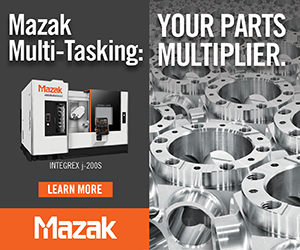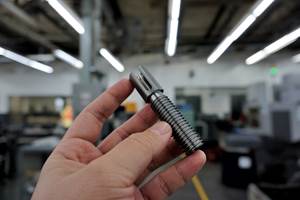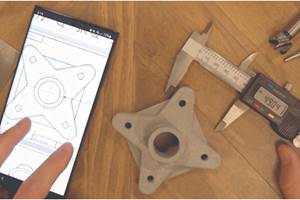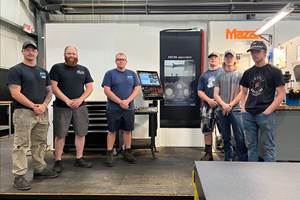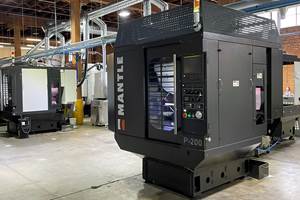The Value of Skills Standards
Members of the American Machine Tool Distributors’ Association (AMTDA), who provide manufacturing solutions through the applications, sales, training and service of machine tools, are keenly familiar with the challenges confronting their customers, U. S.
Members of the American Machine Tool Distributors’ Association (AMTDA), who provide manufacturing solutions through the applications, sales, training and service of machine tools, are keenly familiar with the challenges confronting their customers, U.S. shops and manufacturing plants. These problems include offshore migration of jobs, the depressed manufacturing economy and an uncertain global future.
However, there are strategies for maintaining the viability of the manufacturing base that still exists in this country. Continuing our nation’s preeminence in innovation and productivity is key. But it’s important not to overlook the value of having a qualified workforce, accomplished through the ongoing and concerted effort to upgrade skills.
The National Institute of Metalworking Skills (NIMS) is a consortium of metalworking trade associations, labor organizations, a council of state governors, manufacturing companies and educators that develops skill standards and credentialing assessments. NIMS has awarded 4,000+ metalworking skill credentials and accredited several hundred metalworking training programs.
AMTDA, which is involved in NIMS, recognized the importance of developing a framework of skill standards for machine maintenance, repair and service. Having qualified machine operators is essential for achieving production goals, but so is having machines at optimum performance.
Underwritten by AMTDA and AMT—The Association For Manufacturing Technology, the NIMS Maintenance, Repair and Service skill standards are in the final “pilot” stage to validate both the standards and the credentialing process of service individuals. The standards cover the skill requirements for routine and preventive machine maintenance (Level II) and for machine rebuilding or repair and the servicing of newly installed equipment (Level III). These were the first NIMS standards to earn approval by the American National Standards Institute (ANSI). The ANSI federation’s primary goal is the enhancement of global competitiveness of U.S. business and American quality of life by promoting and facilitating voluntary consensus standards and conformity assessment systems and promoting their integrity.
The AMTDA and AMT member companies participating in the recent pilot program are early adopters of the “most expansive piloting” for NIMS skill standards since the organization’s inception in 1995. The relevance and usage of the maintenance, repair and service standards extend across the entire spectrum of metalworking, positively impacting all affected parties—distributors, builders and customers.
Gosiger Inc. (Dayton, Ohio), an AMTDA distributor member, conducted pilots with service engineers in its branches. “There are benefits across the board in having NIMS credentialed service engineers,” says David Taldo, director of training and development. “For Gosiger, it promotes instant credibility with the customer base. Having NIMS-certified personnel is a benchmark in their minds when evaluating the qualifications of distributors in the machine acquisition process. Likewise, it’s very critical for manufacturing shops and plants themselves to maintain certified service technicians on staff. It promotes their own credibility and increases the confidence in their capabilities from their customers. Keeping machines running is the bottom-line benefit, and having certified service engineers provides the leg-up on the competition to accomplish it!”
Richard Lewitke, technical services manager for Ellison Machinery Company of the Midwest, agrees. “I think the implementation of skill standards for service engineers is important for the service engineer, the company he works for and the customer he is serving,” he says. “The benefits are ‘equally’ important for customers to participate and certify in-house service personnel to be assured of a higher skill level of maintenance on equipment, as well as a more confident and happier employee.”
Company machine service capabilities are of paramount importance to keep all machines—from complex transfer lines to stand-alone non-CNC machines—running at peak capacity and productivity.
NIMS continues to grow, and it is recognized as the national clearinghouse for metalworking skill standards. Simply knowing that standards, certifications and training program accreditation exist, however, is not enough. Industry partners and allies need to develop and strengthen public-private partnerships in training. Companies interested in training and certifying machine operators or service engineers, or developing and accrediting a training program through NIMS should visit www.nims-skills.org.
Related Content
When Handing Down the Family Machine Shop is as Complex as a Swiss-Turned Part
The transition into Swiss-type machining at Deking Screw Products required more than just a shift in production operations. It required a new mindset and a new way of running the family-owned business. Hardest of all, it required that one generation let go, and allow a new one to step in.
Read MoreFinally, A Comprehensive Software Solution Designed for Small Job Shops
Zel X from Siemens is an integrated software application that consolidates collaboration, design, manufacturing, and operations into a comprehensive, easy-to-use solution. From RFQ to delivery, it’s a more efficient way to handle quotes, manage jobs, make parts, and collaborate with teams of all sizes.
Read MoreTop Shop Builds Upon Employee Ownership for Future Success
In its quest to become the Fox Valley’s best-in-class employer, A to Z Machine has adopted an ESOP, expanded benefits and invested in apprenticeships.
Read MoreIn Moldmaking, Mantle Process Addresses Lead Time and Talent Pool
A new process delivered through what looks like a standard machining center promises to streamline machining of injection mold cores and cavities and even answer the declining availability of toolmakers.
Read MoreRead Next
3 Mistakes That Cause CNC Programs to Fail
Despite enhancements to manufacturing technology, there are still issues today that can cause programs to fail. These failures can cause lost time, scrapped parts, damaged machines and even injured operators.
Read MoreThe Cut Scene: The Finer Details of Large-Format Machining
Small details and features can have an outsized impact on large parts, such as Barbco’s collapsible utility drill head.
Read More






.png;maxWidth=300;quality=90)





